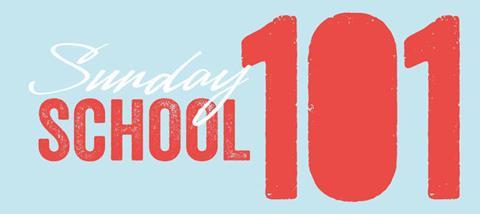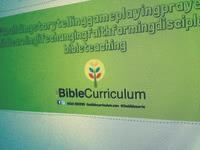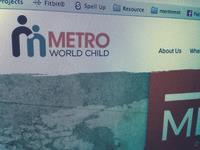
Energize, Urban Saints

age range: 3-18 website: www.urbansaints.org/energizeindex
How to use:
We have specifically designed Energize to offer a ‘pick-n-mix’ selection of online resources, meeting plans, ideas and inspiration for children’s work – a comprehensive and continuous stream of engaging, dynamic and Biblical session material. But there is also provision for following a curriculum. The first resources added to Energize were a four-year thematic syllabus for all age groups, covering everything from patience to poverty. There are also full series of plans for the life of Jesus, Christian foundations and Bible characters – these are the most popular series for use with children’s groups and Sunday Schools - plus many more dynamic, creative resources.
The Energize resources themselves are great for leaders of all levels of experience but who are stretched for time. You can follow each meeting plan word-for-word (all the required equipment is clearly stated and there are notes to put the session in context, including key Bible references) or you can edit the plan – taking activities out, rearranging the order or adding other alternatives. You can even track how long your session is going to last – not to mention have a couple of extra activities up your sleeve in case there’s a gap to fill because the preacher went on a bit! The individual plans are easy to save for later or to circulate to your Sunday School team, via a simple one-click email list, plus can be printed or saved as PDFs. All of this is available in one subscription that covers all ages and aspects of a church’s youth and children’s work provision, so there’s no need to buy resources for each age group or situation.
Paul Windo is the director of resources at Energize
The Bible Curriculum

age range: primary-aged children website: www.thebiblecurriculum.com www.carouselsunday.com
How to use:
All our material can be used ‘off-the-peg’ or as a foundation for developing your own children’s programme. As well as printed lesson planners we produce digital planners that are easy to email to your team members. We produce two different styles of lesson planner: traditional (for groups led by one leader) and carousel (for settings that prefer a workshop-style programme). Each planner includes clear directions on how to play a game, points for discussion, a story written in a child-friendly way with creative storytelling ideas and step-by-step craft instructions. The planners are clearly set out and include space for jotting down notes. We recommend leaders read through the planners a couple of times, highlighting points to remember. Resources for crafts are generally available from supermarkets or can be printed from a PDF.
To run a carousel session you need to follow three simple steps: divide your space into a game zone, a story zone and a craft zone; organise your children into three groups and arrange for leaders to deliver the material in each zone (each leader prepares one zone but delivers the material three times); and finally, rotate the children around the zones. Although we suggest three zones you could add other zones to your carousel session such as a prayer zone or a café zone. One of our users renamed the craft zone ‘the construction zone’ to make it more appealing to boys, and we have heard of all sorts of creative ways of arranging the rotation time.
Jenny Shrimpton has taught children in Church settings for over 20 years and developed The Bible Curriculum more than ten years ago
Click, The Good Book Company

How to use:
The curriculum consists of a leader’s manual for each ten-week unit and a child component that helps children to engage with the Bible for themselves. The Click curriculum is based on the belief that the Bible’s own theological framework should direct what is taught and how it is taught. Each session has a clear teaching point and the activities, which are imaginative and fun, help to support this.
Click has a comprehensive programme that runs from 3-11 with a carefully planned curriculum which will ensure consistent growth in understanding, Bible knowledge and response to the gospel. It contains flexible and adaptable material that works off the page with a huge choice of activities to focus the fun, and is full of faithful, gripping Bible teaching that works with a wide variety of learning styles and teaching gifts to deliver the heart of the Bible’s message. If you’ve never run Click before, the place to start is the 64 page handbook and sample pack which contains sample lessons, sample child components and practical help in running children’s groups.
James Burstow is the commercial director at The Good Book Company
Transformation Station, Metro World Child

How to use:
As a young man in ministry, pastor Bill Wilson struggled to find a way to connect to children. This struggle led him to develop his own curriculum. As a pioneer in children’s ministry, Bill Wilson has been creating curriculum for the past 40 years. His practical and easy to understand principles are taught through dynamic lessons and games that have been proven through the years as well as tested in front of tens of thousands of children.
Metro World Child’s Transformation Station has years of credibility behind it. Used in our missions around the world – New York City, Kenya, South Africa, the Philippines, Indonesia and India – this curriculum has been proven to work, connecting with children from diverse backgrounds and cultures.
This curriculum is ideal for church use or community outreach. It is designed for teachers who have a desire to make their Sunday School programme fun, exciting and more than anything, effective! The word of God is broken down in a way that children can easily understand. The gospel comes alive through activities and lessons that energise and engage them. Through interactive lessons that are flexible for every environment, this curriculum will ignite the hearts of young people to the message of Jesus Christ.
Ellie Palma Cass is the national UK representative for Metro World Child
GO TEACH

How to use:
Go Teach is a specialist publisher of Bible teaching material for children and young people from ages 3 to 14. There is a fouryear syllabus covering the main narrative portions of the Bible for four age groups in mostly parallel lessons. Teachers’ lesson books are matched by a separate set of visual aids which have a free CD containing those visuals in Powerpoint, outline and colour. A workbook is available for children with activity sheets for each lesson.
There’s no need to search the internet for components to build your own lessons. Go to www.goteach.org.uk and you will find Go Teach has done everything for you by putting together lessons that are accurate, attractive and accessible. Our large team of writers produce lessons which are faithful to the Bible and interesting to children. Our experienced team of editors ensure those lessons present the gospel and are applied to the lives of the children. Our skilled team of illustrators and designers create interesting and realistic pictures to hold the attention of the children. Our diligent directors meet regularly to manage the whole ministry efficiently. All are working together to put reliable resources into your hands at a realistic cost. Although we have been in existence for over 65 years, we are far from out of date. A new craft book and has recently been added to our range which includes holiday Bible clubs, colouring books, maps and posters. Material for older teens will soon be added to our recent publication of sessions for creches and toddler groups.”
Ray Tibbs is the editorial director of Go Teach
ROOTS

How to use:
Sunday School… youth groups… afterschool clubs… Roots can give fresh ideas and inspiration – week in, week out.
Each week, Roots Children & Young People magazine focuses on one of the lectionary readings. It offers fresh ways to present the Bible reading to children and young people and helps leaders to explore it with their group – through activities, prayers, craft work, games, reflection and discussion. The materials are wide-ranging and flexible, so sessions can be planned to work best for the group. And with a wealth of material to choose from, there’s enough to use all week long: not just on Sundays!
Rosemary Nixon is the Roots managing director
Light, Scripture Union

How to use:
Each title in the range offers a flexible toolkit of fun, Bible-centred sessions with crafts, games, stories, dramas and songs that need little preparation (and there’s always one ‘ready-to-use’ option if your preparation time is really short). There are also optional extra resources available online for you to use if you wish.
However big or small your group, wherever you meet, whatever the learning style of the children, you can easily adapt Light to fit your needs, so that you and the children can focus on building relationships and learning about God together. Each session features a menu of activities. Each menu item outlines the learning purpose of the activity and how long it takes, lists the materials you’ll need, and walks you through it step-by-step. You just need to pick and choose what will work for your group.
Light helps equip children and young people to live as people of light at school, at home and at church – to bring glory to God through all they are, say and do. Children’s workers are often very busy people, and need something that is simple to use, easy to adapt, and doesn’t take hours of preparation. We know from our own extensive frontline ministry experience that children learn best when they are playing and having fun, so that’s the style of Light, giving them a really good grounding in the events and key teachings of the Bible. Everything in the Light range has been developed with the help of Bible scholars, education experts, and children’s and youth leaders. We have done all the hard work, so you can use the materials with confidence in a way that works for you.
Terry Clutterham is the director of Ministry Development at Scripture Union
Now, it’s true that the descriptions of these resources may make each of them sound like the best thing since sliced bread. The reality is that some will suit your context, the children in your group and the skills that you have in your team, and others won’t. If you’re looking for a resource, be prepared to try out a few before settling on one. As you try them out, here are some questions to ask yourself:
Does this material help children get to know God better?
Will it help to foster skills that will help children grow in their faith?
Is there space for the children to reflect on and respond to what God is saying to them?
Does it handle the Bible with care and integrity?
Does it cover lots of different learning styles (visual, kinaesthetic, musical etc)?
Is it easy to use and are the instructions clear?
Does it require lots of extra resources? (If it does, that’s not necessarily a bad thing, but you’ll need to invest more time and money to gathering these together.)
And remember, whichever resource you choose, you’ll have to adapt it to fit your group. The resource providers expect you to, so don’t feel guilty if you need to change, swap or miss things out!
HOW NOT TO RUN A SUNDAY SCHOOL
• Premier Childrenswork’s Jamie Cutteridge shares some nuggets of wisdom
Plan it early on a sunday morning
‘It’s only Sunday School, I can whack something together in half an hour, right?’ WRONG. Think about how long people work on sermons, not how long it takes you to get ready for church as your guide. In reality, if you leave it until then you’ll either plan something remarkably basic and boring, or be unable to find the specific pipe cleaners you need at the last minute.
Just show a video
We get it, sometimes over the summer there aren’t enough leaders and a collective viewing of Veggietales is the only option – but don’t make this the norm. Imagine if one Sunday your vicar stood up at the start of his sermon and said: ‘Today, we’re going to be watching an episode of The Vicar of Dibley.’ It wouldn’t go down well.
Don’t restock the craft cupboard
Genuine fact: 74 per cent of all felt-tip pens don’t work. Ok, it’s not a genuine fact, but it doesn’t seem THAT unrealistic. It’s worth giving the resources at your disposal a regular check-up, so that when it comes to use them, it doesn’t take little Jonny 45 minutes to find a working red pen.
Overdilute the squash
This is very important. There’s nothing worse than weak squash – it will probably make or break your meeting time if the drinks taste mainly like water. On the other hand, if you don’t put enough water in, you’ll have children bouncing off the ceiling. The art of squash making is an exact science, one that requires years of practice.




























